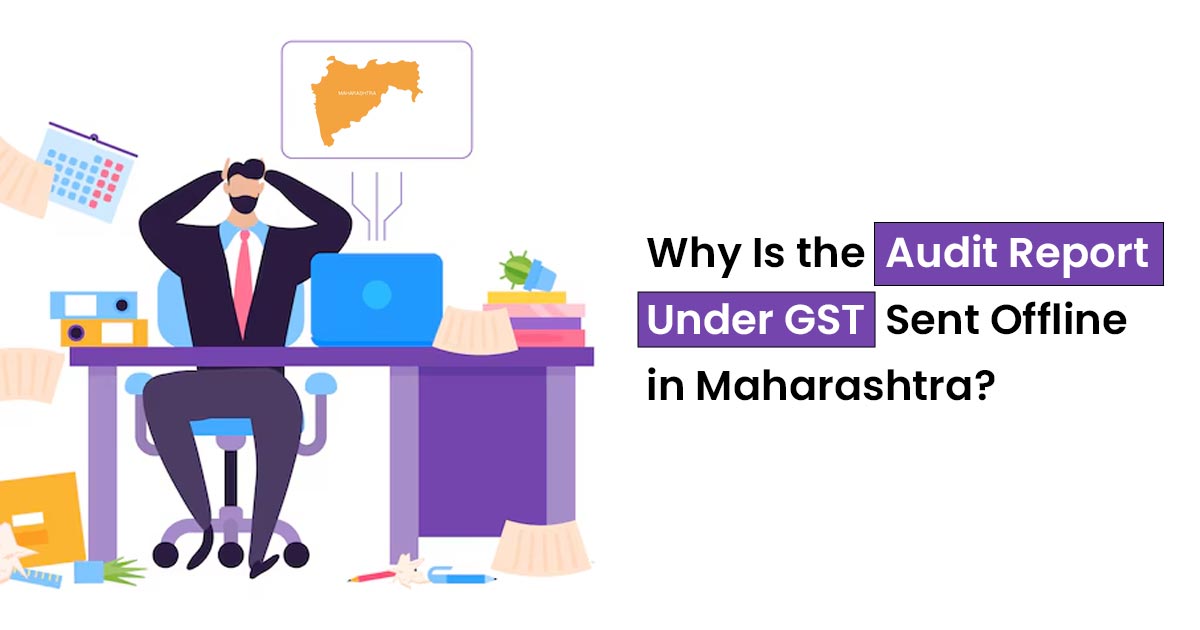
The Goods and Services Tax (GST) department typically initiates an audit when it detects discrepancies or suspicious activities, such as inconsistencies in GST returns or a significant mismatch between input and output tax credits. After completing the audit, a report is prepared, and a notice is issued to the taxpayer based on the findings.
For the financial year 2020-21, where the deadline for issuing a GST notice under Section 73 is November 30, 2024, the Maharashtra GST department has made changes to the procedure. Instead of the usual online format, both the audit report and notices for discrepancies will be sent offline. This adjustment was reasoned to technical challenges with the online system.
To finalize the audit for FY 2020-21, GST proper officers are now permitted to send communications, such as the Discrepancy Notice under Rule 101(4) and the Final Audit Report (GST-ADT-02), through offline methods. According to a circular issued on November 8, 2024, these documents will not be uploaded to the GST portal but will be delivered using alternative methods specified under Section 169 of the GST Act.
Why Is the Procedure of Sending the GST Audit Report and Notice for FY 20-21 Changed to Offline Mode?
The Maharashtra GST department explained in its circular that receiving complaints from proper officers about technical issues with the online audit functionality hindered the processing of follow-up actions. Consequently, the decision to use offline procedures was made to ensure the smooth completion of audits for this period.
Is the Deadline Given u/s 73 Notice Extended or Will It Be Released on Nov 30, 2024?
The Maharashtra GST department confirmed that the limitation period under Section 73(10) of the GST Act remains unchanged. The deadline for issuing notices related to FY 2020-21 is still November 30, 2024. However, technical glitches necessitated modifications to the usual online procedures.
Experts confirmed that under Section 73, notices must be issued within three years from the due date for filing annual returns. For FY 2020-21, this three-year period ends on February 28, 2025. Processing backwards, in these cases notices should typically be released at least three months before given deadlines as additional relief for proceedings. To allow sufficient time for follow-up actions, the notices are expected to be issued by November 30, 2024.
Will Show Cause Notices Be Sent Offline?
The circular clarified that show cause notices (SCNs) arising from audit findings, such as demand and recovery actions (GST-DRC-01), will still be issued online through the GST portal. The offline process is only applicable to discrepancy notices and audit reports.
To ensure a complete record of audit activities, the Maharashtra GST department directed proper officers to upload all manually issued notices and Final Audit Reports (GST-ADT-02) to the GST portal by December 31, 2024. Once uploaded, these documents will be accessible to taxpayers through the portal’s defined workflow system.
However, taxpayers are advised to disregard any duplicate versions of notices or reports on the portal if they have already received the physical copies.
These procedural amendments show the Maharashtra GST department’s efforts to address technical challenges while maintaining compliance with statutory deadlines and ensuring transparency in audit processes.
When Are Taxpayers Subjected to a GST Audit? Are Any Discrepancy Required?
According to advisors, GST audits are not mandatory and there are no fixed criteria for selection. Various factors such as turnover, significant changes in financial data, risk parameters, compliance history, sector type, past performance, and exceptional reports are considered. Random selection can also be practised. Taxpayers are chosen based on a risk evaluation system devised by the Directorate General of Audit in collaboration with the Directorate General of Analytics and Risk Management.
Advisors explain that while GST audits are not compulsory, they are frequently used as a tool to boost revenue, reduce tax evasion, and ensure compliance due to the relative newness of GST laws. Risk-prone scenarios such as mismatches between ITC claims and declared output tax, inconsistent filings, delayed payments, incorrect tax calculations, or deviations from industry norms can also prompt an audit.
How Circular Impacts GST Registered Taxpayers Subjected to GST Audit?
Experts shared their views on the challenges posed by the recent circular allowing offline communication for GST audits.
Here Is What Experts Have to Say:
Experts say that offline notices might not reach taxpayers promptly, leading to disputes about receipt dates. This delay may reduce the response time for addressing discrepancies and escalate minor issues into full-blown tax litigations, contrary to the goal of minimizing disputes.
GST’s design emphasizes digital processes. Offline reporting contradicts this approach, even if technical issues make it unavoidable. Offline notices might lead to delays, misplaced documents, or missed follow-ups, disrupting the system’s efficiency.
Offline communication lacks the instant delivery and tracking provided by the GST portal. This may result in missed deadlines and slower response times, requiring taxpayers and officers to adopt additional monitoring mechanisms.
What Experts Suggest to Taxpayers?
Experts advised taxpayers to take proactive measures to handle the procedural shift effectively:
- Since notices will eventually be uploaded to the GST portal by December 31, 2024, taxpayers should keep physical copies to cross-check details and prevent confusion.
- Taxpayers should ensure timely reconciliation of their GST returns and address discrepancies quickly to avoid detailed scrutiny during audits.
- With offline notices in play, both taxpayers and GST officers must establish robust tracking mechanisms to ensure deadlines are met and actions are completed without delay.
The offline process addresses IT system glitches, it presents logistical challenges that may disrupt the seamless functioning of the GST system. Taxpayers need to remain vigilant and adapt to these procedural amendments to maintain compliance and avoid complications during audits.